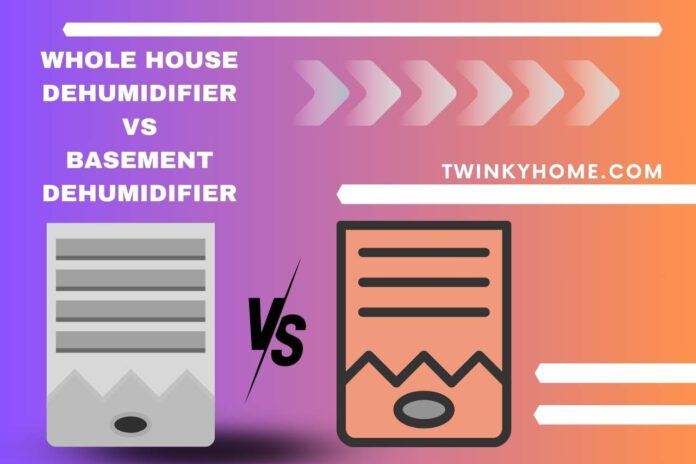In the quest for optimal indoor comfort and moisture control, the debate between “whole-house dehumidifier vs basement dehumidifier” plays a pivotal role. Homeowners grappling with humidity concerns must navigate the intricacies of these two options to ensure effective and targeted solutions. From evaluating the size and layout of your home to understanding the distinct advantages each type offers, this discussion will provide you with a clear insight to make the best decision. So, join us as we explore the world of dehumidifiers, unraveling the complexities of whole-house systems seamlessly integrated with HVAC and basement units designed for targeted moisture control. By the end, you’ll be equipped with the knowledge needed to make an informed choice tailored to your home’s unique humidity challenges.
Whole House Dehumidifier vs Basement Dehumidifier
There are clear differences between whole-house dehumidifiers and basement dehumidifiers. When we discuss the distinctive characteristics of each unit, you will understand what suits your home better.
Whole-House Dehumidifier:
- Capacity: Engineered for larger spaces, capable of handling the humidity needs of an entire home.
- Integration: Typically connected to the central HVAC system, ensuring seamless operation alongside heating and cooling systems.
- Installation: Requires professional installation because of its integration with the HVAC system, potentially involving ductwork modifications.
- Coverage: Provides comprehensive dehumidification throughout the entire house, maintaining consistent humidity levels across multiple rooms.
- Cost: Undoubtedly, there will be higher upfront costs compared to standalone units, including both the unit itself and professional installation expenses. And when it needs an occasional repair, you have to spend a considerable amount of money.
- Maintenance: Generally low maintenance, as it operates in conjunction with the HVAC system. Minimal manual intervention is required.
Basement Dehumidifier:
- Capacity: Tailored for smaller areas like basements, offering efficient humidity control for localized spaces.
- Portability: Standalone units with the flexibility to be placed in specific areas or rooms, addressing localized humidity issues where needed.
- Installation: Easy to install without professional assistance, making it a more DIY-friendly option. There is no need for complex ductwork modifications.
- Coverage: Provides targeted dehumidification in specific areas, making it suitable for addressing basement moisture concerns.
- Cost: More budget-friendly, with lower upfront costs compared to whole-house systems. Likewise, installation expenses are minimal since there is no labor cost.
- Maintenance: Requires periodic manual maintenance, including emptying water reservoirs. Users need to monitor and manage the unit operation.
Accordingly, both units fulfill the need for dehumidifying at different levels. Thus, choosing between a whole-house and basement dehumidifier depends on the scale of humidity control needed, the size of your home, and budget considerations. Whole-house systems offer comprehensive coverage but come with higher costs and installation complexities. On the other hand, basement dehumidifiers provide a more localized solution, making them cost-effective and easier to install, but they may not address humidity concerns throughout the entire house.
What Should you Consider When Choosing a Dehumidifier, Whole House or Basement Dehumidifier?
Choosing between a whole house and a basement dehumidifier involves considering several factors to meet specific needs. You are advised to consider these points before making your decision.
- Humidity Levels: Most importantly, assess the overall humidity levels in your home. If moisture issues are widespread across different levels, a whole-house dehumidifier may be more suitable. For localized basement concerns, a dedicated unit may suffice. If you cannot predict, seek a professional’s estimate.
- House Layout: Consider the layout and size of your home. Whole-house dehumidifiers are designed for larger spaces, while basement units cater to more confined areas. Sometimes, a combination will be necessary for optimal coverage.
- Integration with HVAC: If your HVAC system can accommodate it, a whole-house dehumidifier offers seamless integration and comprehensive coverage. However, if this is not feasible, standalone units strategically placed in problem areas may be more practical.
- Budget: Evaluate your budget constraints. Basement dehumidifiers are generally more cost-effective, while whole-house systems involve higher upfront costs, including labor costs for the installation.
- Targeted vs. Comprehensive Control: Determine whether you need targeted dehumidification for specific areas or comprehensive control throughout the entire house. Combining both types may offer a balanced solution.
By weighing these factors, you can make an informed decision that aligns with your specific home and humidity control requirements.
Can you Use One Dehumidifier for a Whole House?
You can use one dehumidifier for the whole house, but you will not be able to achieve the desired result.
Only one dehumidifier may not be sufficient, especially if the home is multi-story or has distinct humidity concerns in different areas.
Basements, in particular, often require dedicated dehumidification due to their susceptibility to higher moisture levels.
While a whole-house dehumidifier integrated with the HVAC system can provide comprehensive coverage for the upper levels, it may not effectively address localized basement humidity issues.
For optimal results, it would be better to use a separate dehumidifier for the basement to target specific moisture challenges in that area.
This dual approach ensures that each section of the house receives tailored humidity control, preventing potential issues such as mold growth and musty odors in the basement.
Ultimately, the choice depends on the specific needs and layout of your home.
You May Also Like
- How to Drain a Basement Dehumidifier? Step-by-Step Guide
- How Long for Dehumidifier to Dry Basement? Unveiling the Drying Magic!
- How to Clean Basement Dehumidifier? Crystal Clear Air!
- How to Keep the Basement Dry Without a Dehumidifier? (Tips & Tricks)
- Does Dehumidifier in Basement Help Upstairs? The Ripple Effect!
- How to Choose the Right Dehumidifier for the Basement? Basement Bliss!
- Why does My Basement Dehumidifier Ice Up? Decoding Dehumidifier Woes!
- Can you Run Two Dehumidifiers in the Basement? (Ins and Outs)
- How Long Should a Basement Dehumidifier Last? Investing in Comfort!








![OGX Biotin And Collagen Shampoo Review [Updated One] Ogx Biotin And Collagen Shampoo Review](https://twinkyhome.com/wp-content/uploads/2022/03/Are-chicken-Super-Noodles-vegetarian-1-100x70.jpg)